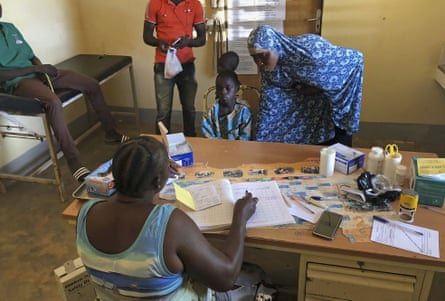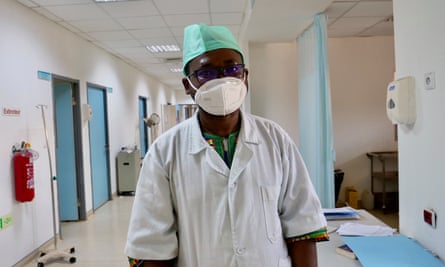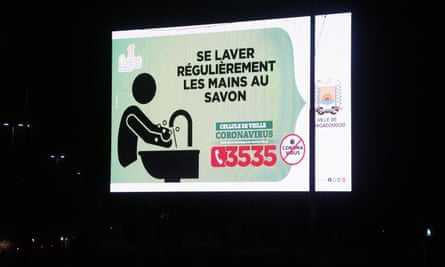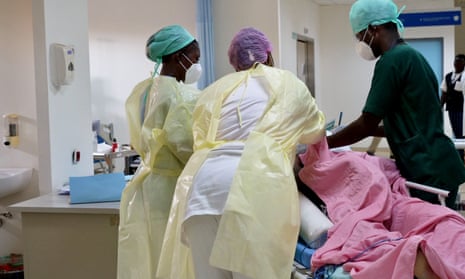When stocks of medical equipment in the general ward of Tengandogo University hospital in Ouagadougou ran low as resources flowed to the coronavirus unit, medical staff bought the essentials themselves.
Blood pressure monitors, glucose monitors and oximeters were needed. Even the ink in the printers had to be replaced.
The hospital closed to non-Covid patients during Burkina Faso’s first wave in March but reopened in July to treat the numerous other illnesses that affect the population of approximately 20 million people. Without any emergency budget for resources, doctors faced a challenge.
“The pandemic has had a big impact on resources, especially things like oxygen that are needed for coronavirus treatment,” Dr Lassina Séré, a senior practitioner, told the Guardian. “In terms of equipment, some things that the hospital used to be able to pay for are no longer covered by the budget because it’s all been used on Covid, so what the doctors have done is start initiatives to buy what’s needed ourselves.”
Tengandogo is one of Burkina Faso’s leading health institutions. A sprawling blush pink complex, it’s eerily quiet. There is no buzz of machines or the drone of a hospital intercom. It’s a private facility that treats the country’s most critical patients, but since March it has treated people with coronavirus without charge.
Before the pandemic this landlocked country had a shortage of specialist staff, especially in rural areas where the quality of care is considerably lower. Poor salaries coupled with growing insecurity in the north and east due to militant violence have led many young professionals to leave, and deterred others from coming. In Tengandogo, the staff are overworked, and when some have had to self-isolate, it has been a struggle.

“We had to create a new Covid area in the hospital. We couldn’t hire new personnel, so we had to take from the regular staff, which means there are shortages on the other services,” says Dr Moussa Kabré, head of the general ward. The slight 41-year-old is exhausted, and says recent months have been among the most challenging of his career.
Respiratory diseases such as pneumonia are the leading cause of death in Burkina Faso. Dr Christian Jules Wenl Minoungou, head of respiratory medicine at Tengandogo, has struggled to access resources. One patient under his care, 23-year-old Philomon, has been in the general ward for two months with an undisclosed respiratory disease. His body has wasted away and speaking has become uncomfortable. On the floor next to him sits his tired mother, Delphin. “My only hope is for my son to get better and recover,” she says.
“There are only 30 lung specialists in this country,” says Minoungou. “Pneumonia is the first cause of death here and if you don’t act quickly the situation deteriorates. We need more resources to deal with it. People are always coming in from the countryside in an advanced condition because they are unable to get care there.”
The director of Tengandogo, Ferdinand Tiendrébéogo, agrees: “When you look at the figures, coronavirus is not a priority. It’s very small compared to, say, malaria. That said, you do need to keep an eye on Covid because you never know what can happen with it, but overall it’s been a very resource-intensive disease for this hospital.”
Crossing the threshold into the ICU at Tengandogo, the quiet is replaced by the steady beat of heart monitors. A handful of nurses care for four Covid patients and the 12 other patients who are at the other end of the ward. Some of the staff are in full PPE, others wear only mask and gloves. In the corner by the door is a pile of discarded garments.

Ally Ouattara, the unit’s head nurse, is six hours into his shift. The smile behind his mask reaches his eyes and he stands out in brightly patterned scrubs. He carefully recounts the details of each of his Covid patients. Two men in their 60s with underlying health conditions. A middle-aged woman with a history of TB. The fourth, Ismail, 50, is being moved to the recovery ward after eight days. It’s a moment of celebration for the staff in a ward where the Covid survival rate is 50%.
According to the Africa Centres for Disease Control and Prevention, there have been 11,847 lab-confirmed cases of Covid-19 in Burkina Faso and 139 deaths. The true figure is thought to be higher as testing is limited to about 2,000 rapid tests a day.
Track and trace is nonexistent and daily life for millions of people continues as normal despite some earlier restrictions. Since late November the Burkinabé have seen a second wave that led to a spike in admissions and renewed fears that hospitals could be overrun. Dr Brice Wilfried, the director of Corus, Burkina Faso’s health emergencies organisation, says the second spike is in decline, after a fall in cases over the past two weeks.

Dr Jerry-Jonas Mbasha, health cluster coordinator for the World Health Organization in Burkina Faso, says: “We need to understand the fragility of the health system here before Covid-19 and what’s happened over the last year is a significant amount of extra stress. There already was a strategy to identify specific respiratory diseases across the country and what we did to ensure that continued to function was integrate Covid testing into that structure and that’s been quite effective.”
For Séré, Covid is more of an economic problem than a health emergency. “It’s changed our access to resources and the attention it’s getting here is disproportionate compared to the impact,” he says.
Like his colleagues, he believes that quality care has to continue for all patients even if it means financing it from their own pockets.
